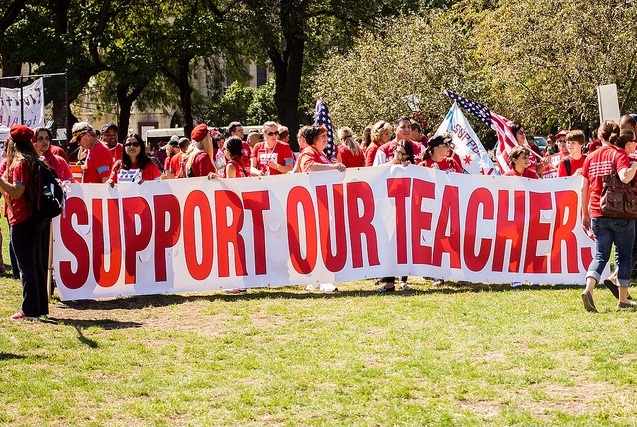Chicagoist's Top Stories Of 2012: The Chicago Teachers Strike
By Chuck Sudo in News on Dec 30, 2012 7:00PM

© Ryan Williams, used with permission
To those of us who paid attention, the first Chicago teachers strike in a quarter century had a sense of inevitability to it almost from the moment Rahm Emanuel was sworn in as Mayor in May 2011. It also served as the first major labor defeat in his mayoralty (no matter how he or they may spin it); made Chicago Teachers Union President Karen Lewis a national player in labor circles; gave hope to other unions looking to hammer new deals with the city, like the police and firefighters unions, a successful template with which to work; and saw the teachers union keep the heat on the school system and Emanuel after the new contract was ratified.
Lewis’s leadership of CTU in the months leading up to and during the strike and the amazing swing in public support for the union once the strike was called—only 6 percent of respondents to a Sun-Times/McKeon and Associates poll thought Emanuel handled the strike well—was nothing short of extraordinary considering how the Emanuel administration, former Chicago Public Schools CEO Jean-Claude Brizard and the Chicago School Board were able to control the early messaging with calls for a longer school day and put the union temporarily on its heels. One of the keys to that shift was when the union and city agreed to a deal to bring aboard new teachers to implement a longer school day. CTU had long agreed with the school board on a longer school day but wanted it, and the overall school day, to be better implemented; they don’t want the extra 90 days to be recess. The inept, almost nonexistent, leadership of Brizard only helped to strengthen the bond between Lewis and the union. Brizard was out as CPS CEO shortly after the strike ended, but not before receiving a sweet severance package.
Emanuel’s relationship with organized labor had always been lukewarm, dating to his days in Congress. His administration’s position on negotiating work rule changes with city labor unions is consistently framed in press releases as protecting the interests of Chicago’s taxpayers. Labor unions, for the most part, have found common ground on work rule changes with the city. But his stance with the teachers union has been particularly belligerent and, in Lewis, he found a labor leader who wasn’t intimidated by him and who also had the overwhelming support of her rank-and-file. But it wasn’t supposed to happen this way. Changes in state law made it so 75 percent of a teachers union’s membership had to vote in favor of a strike in order to call one. 90 percent of CTU’s rank-and-file voted in favor of a strike authorization in June, leading Emanuel’s City Council floor leader, Patrick O’Connor (40th) to say the strike should lead to a debate about banning teachers from striking. Advisers to Emanuel like venture capitalist Bruce Rauner didn’t conceal their contempt for the teachers union.
In the three months since agreeing to a new deal, the teachers union has been on the offensive to hold Emanuel and the school board to their word. A new website, Move Chicago Schools Forward, was launched to serve as a resource for teachers, parents and students to fight school closings proposed by the School Board. Videos like “The Fat Cats,” heavy handed as it was, served to remind the union’s supporters of the School Board’s and Emanuel’s plans to expand charter schools and close or consolidate underperforming schools. Lewis has long been a staunch opponent of charterization, saying their existence takes sorely needed resources away from the school system.
Earlier this week a lawsuit was filed earlier by three teachers (with the support of the union) alleging that turnarounds of underperforming schools on the South and West sides discriminate against black teachers and staff. CTU’s actions since the strike ended indicate they understand the strike was merely a battle in an extended war for Chicago’s public schools.